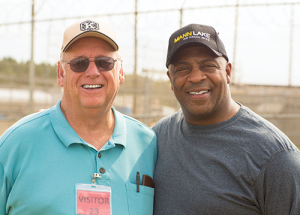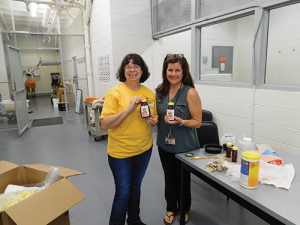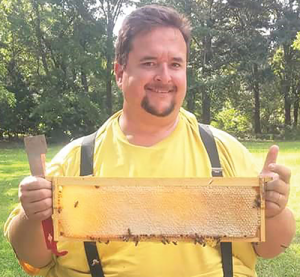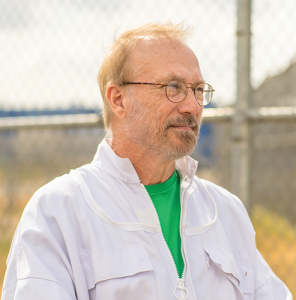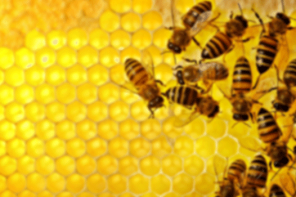By Jennifer Berry
Last month’s article highlighted the first ladies to have passed the Georgia Master Beekeeper Journeyman exam. This was possible because of the Georgia Beekeeping Prison Program which to date has certified over 80 inmates behind bars. But more importantly, this is due to the hard work, kindness and selfless sacrifices of those who volunteer. The ones who take time out of their busy schedules, lives and work to drive to these prisons. The ones who go through background checks, and the same airport security measures (with even more scrutiny) so they can teach those so desperate for knowledge and a taste of the outside. I want to highlight each of these wonderful people and shine a bit of light onto them since they have brightened so many lives over the years. I’ve asked each of these volunteers to write, in their own words, how they became interested in bees, how they became a part of the prison beekeeping program and why it needs to thrive. Here are those making a difference.
Bear Kelley
I started beekeeping around the Fall of 2007 from a wild idea that I could have all the honey that I wanted. Wow, from there this little hobby blossomed into a real life changing event for me. My love of nature has always existed and flourished as I lived on a boat for ten years enjoying the coastal United States from the Florida Keys to Maine. I learned to appreciate nature’s way of expressing herself with her different moods and weather patterns as well as the wide variety of sea life. But when I started keeping bees, I became immersed into their world and was not only fascinated but wanted to change the many things we do as humans in order to protect these little creatures. It started off small when I stopped killing dandelions growing in the yard and ceased using so many chemicals. I realized these actions were a detriment to bees and other creatures and decided to provide them with life instead of elimination. But it didn’t stop there. The more I studied, the more I became involved with the politics of beekeeping, from the local level, to the state level, to the national level. Serving as the President of the Georgia Beekeepers Association, it allowed me to help bees in a different capacity and to meet so many others who have been “stung” as bad as I.
In my travels around Georgia, I learned of an Inmate in one of the state prisons who had an interest in beekeeping before he was incarcerated. I coordinated with the Warden to meet this inmate who had started teaching an introductory beekeeping course. As I was introduced to each of the students taking this class, I saw in these men a sincere desire to learn more about the practice of beekeeping. From there, I took it upon myself to coordinate with the state officials and the University of Georgia to expand the program and insure that they had bees, hives and plenty of study material. I coordinated with the local bee club and encouraged them to take on the challenge of mentoring the inmates and assisting them with the success of this new endeavor. It worked so well, that numerous inmates at that facility are now Certified beekeepers through the Georgia Master Beekeeper Program. It is also part of their prison educational records. From that project, blossomed beekeeping programs in six facilities across the state and is now part of the state educational program.
The volunteers who have stepped up to mentor and are dedicated to this program have been remarkable. Although they may seem tireless, since they all have day jobs, family life and their own bees to manage, I’m afraid the time will come when they must move on. Somehow, we must encourage new volunteers to step in and even get the state legislature to fund a state apiarist position to travel to each prison and coordinate activities; such as one facility growing queen bees, one facility building hives and another preparing bee packages and nucs to transfer to the other facilities.
I visited each of the prisons and talked to the inmates at length about their future in beekeeping. The interest is strong, and I believe sincere. A few revealed that before this started they had no hope. But now they have something to learn, practice and hopefully benefit from upon their release. In addition to all that, they are amazed at the life-giving effort of the bees and take it personally when some of them die or a hive swarms and departs the prison apiary.
This has developed into an important program that must continue and spread throughout other prisons because it is giving these folks something for their horizon; something to believe in and something real that they can prosper from. Not only in the monetary sense, but the personal gratification for giving life to a creature that often gets bad press but is so important to our very existence. Bees were instrumental in changing my life, so I hope they can continue changing lives on the other side of the wall.
Julia Mahood
Growing up in a house full of girls who were all terrified of bugs, I never imagined that I would become a beekeeper. Things that flew and stung were to be completely avoided. But when I became a mother, my two sons introduced me to the fascinating and wonderful world of insects. In 2004, I was inspired by the book, The Secret Life of Bees, thereby taking a weekend course at the Campbell Folk School. My yard, and passion for bees, has been buzzing ever since. I have hives at my home, at community gardens in Atlanta, and in the north Georgia mountains.
I have found that the educational opportunities within the beekeeping community, both as a student and as a teacher, have greatly increased my enjoyment and continued fascination with all things Bee. In March 2016, I expanded my love for bees by teaching in the largest women’s prison in Georgia. This all came about when I heard about the Georgia Beekeeping Prison Program from Bear Kelley. I told him if there is ever a program at a woman’s facility, please let me know. Months later, Arrendale State Correctional Facility contacted Bear about starting a beekeeping program. That’s when I got the call.
I decided to give a lecture first to the general audience to see how many women would be interested in taking a beekeeping class. 300 women signed up for the lecture but because certain populations can’t be together in the same room, they broke it into two lectures, at separate times. Afterwards, 100 women signed up for the class but only 24 were selected.
Teaching at Arrendale has been very rewarding since I have always been a huge advocate for inmate vocational training, but driving several hours each way, twice a week, for a year, was becoming a real hardship. After the first class was certified, I decided to visit the prison once a month. Unfortunately, no other volunteers were available, and without a volunteer, the women are unable to visit the bees when needed. The apiary is located at the back end of the prison grounds, and one must traverse through numerous locked gates in order to get there. Like most of the prisons in Georgia, they are underfunded and understaffed, so finding a guard willing and able to escort the students to the apiary, even once a week, was not happening. That’s when I decided I needed to be there more often and returned each week.
There are other issues one faces when teaching behind bars, besides the obvious. You’ll be in the middle of teaching a class, alarms sound off signaling there’s an emergency count, which means everyone must return to their dorm, immediately, no exceptions. So much for that class. Or there’s a new guard at security who decides you are not allowed to bring in your teaching materials. Or there’s a lock down which no one is allowed into prison. Plus, it’s impossible to communicate with the women inside since there is no email, no phone, no text.
Even though there are obstacles, there is so much good coming out of the program that it far outweighs the problems. Since March of 2016, there have been 26 women certified through the Georgia Master Beekeeper Program. Plus, the classes and beekeeping experiences enrich their lives in so many ways. You can see it on their faces; how excited they are that you are there to teach them, and how excited they are learning about something they love. The women are so grateful for the experience and anything you are willing to share with them. I truly love my involvement in the program not only because I see how happy it makes these women, but for the experiences I’ve gained as well. And let me tell you, it’s really hard to feel sorry for yourself after spending four hours a day in prison, because at the end of it all, you get to go home.
Virginia Webb
My Father, Joe Stephens bought me my first beehive in the early 1960s. This was a family hobby and I can remember as a young girl the joy of watching bees going in and out of the beehives and fascinated with their behavior. Extracting honey was always a special time for us, with the honey house filled with supers of fresh honey, I always imagined that heaven would smell like freshly extracted honey. 50+ years later I am still keeping bees (so is my Dad) and enjoying each and every day as a beekeeper.
When I lived in Atlanta, one of my volunteer activities was a program of Prison Ministry with women. This involved providing services for women held at the Federal Detention Center in Atlanta. It was a program I became involved with through a friend.
After moving to Habersham County in the late 1990s, I began my career as a full time commercial beekeeper, but I still enjoyed working with new beekeepers and speaking about bees throughout the state and nation. In 2016 the Georgia Beekeepers Association inquired through our local beekeeping club if there was interest in teaching beekeeping at Arrendale State Women’s Prison. This would be a first class in a women’s state prison in Georgia. I personally liked the idea of providing vocational training to inmates.
Working with individuals who have never seen the inside of a beehive is exciting for me. The women we work with were excited about the program and we began by focusing on the fundamentals of getting started in beekeeping. I am the helper in the class that is led by Julia Mahood, Master Beekeeper from Atlanta. It was great seeing how dedicated she was in getting the class started. After two months of reading “First Lessons in Beekeeping”, the bees arrived (six packages) and we were ready to get to work.
The women at the prison have come a long way in three years. The women have their own beekeeping club, and fall under the guidance of the Georgia State Beekeepers Association. One great accomplishment they have made is through the UGA Georgia Master Beekeeper Program. All of the women have passed the first level “Certified Beekeeper” and a number have also passed the second level “Journeyman Beekeeper”. I believe many will continue this track and become Master Beekeepers in this program.
Each of these women who are in our beekeeping class show a dedication to the program. They continually work to find ways of sharing their knowledge of beekeeping with other inmates and visitors and family who visit on weekends.
For a beekeeping operation, needing to find qualified and confident beekeepers to work, should consider giving an ex-offender who has been through the prison beekeeping training a job. In some employment, working with the Georgia Dept. of Corrections, a candidate you hire could be bonded by the GDC and they may supplement part of the ex-offenders salary for a period of time. Because I do not have all the information needed, you can check with the Georgia Dept. of Corrections for eligibility.
Having this program certainly gives purpose to many of our students. That is a sweet reward for this important program being offered. I am very grateful that the Georgia Department of Corrections is allowing this vocational training for the ladies at Arrendale.
Broadus Williams
I have been keeping bees for over six years now. I got interested in bees because of a problem I was experiencing at my farm. I had planted several fruit trees, and they were about five to seven years old but would not produce any fruit. Each year there would be lots of blossoms on the trees but never any fruit. That’s when I started to read and research for answers. I bought a few books on gardening and fruit trees and found out that fruit trees need bees or pollinators to produce. I remember learning about pollination when I was in grade school, and I had also helped my kids learn about it as well. However, it did not register until I was face to face with the problem.
I joined a local bee club and purchased one hive, which quickly became nine hives, which then became 49 hives and the numbers just keep growing. Now to my amazement, my trees are finally producing fruit.
The former president of our local club and, at that time president of Georgia Beekeepers Association, was Bear Kelley. One day he invited me to help him with the prison program and I was happy to join in. It’s a great program and the guys just soak up the information. I saw a lot of pride in the guy’s eyes as they showed us their apiary and passed their exams. It was also very important to them that they do well and continue in the program. They asked lots of questions and were all very eager to hear the answers.
There are many challenges the guys face on a day-to-day basis, but then add beekeeping? Getting beekeeping tools and equipment behind bars is not easy and then getting to use those tools and equipment is even harder. But it is worth it for them. Bees and beekeeping have brought these guys together and to keep their bees thriving, they must help each other out, put away their differences and work side by side for the same cause. That to me is the greatest return, which is why I hope the program will continue to grow because of all the good it is doing on the inside.
Brutz English
I’ve been keeping bees for ten years. I was introduced to beekeeping while I was incarcerated. I had a cell mate who had kept bees before he was in prison, and he introduced me to the idea. I checked out some beekeeping books through the prison library system, and once I was released I purchased two colonies. Since then, my love for beekeeping has changed my life. I have become a commercial honey producer, a Georgia Master Beekeeper, and a Senior Welch Honey Judge. I started a local bee club in my area, and I have served several terms as club president. I have served six years as an elected member of Georgia Beekeepers Association (GBA) Board of Directors, and I was the GBA’s 2017 Beekeeper of the Year.
I became involved in the Georgia Beekeeping Prison Program right after I heard about it. Once I realized there was a prison out there willing to let us in, and there were beekeepers out there willing to go in; I knew I had to get behind this program. I became an advocate on the GBA Board for the program, and in 2017, convinced my local club to agree to sponsor one of the prisons in our area.
I want to see the beekeeping prison program expanded system-wide in Georgia. I also want the GA Department of Corrections to commit to a full-time position which will train inmates and help facilitate the beekeeping program in individual prisons. I would like to see more support and involvement from local bee clubs and local beekeepers. We need more volunteers to help out with these programs, especially starting up at new prisons. I would also like to see the day where we gave program graduates bees and equipment once they are released from prison. Finding work for newly-released prisoners is hard and getting the extra money to get into bees will be tough for anyone coming out of prison. Giving them the basics to get going will give them something constructive and productive to do straight away.
There are many reasons why this program is important. I’m sure some of the other program sponsors will list off the vocational and rehabilitative value, or the structure and discipline beekeeping can teach, or even the constructive use of time and resources for inmates. For me though, this program is about opportunity and redemption. Beekeeping gave me both. Beekeeping gave me something constructive and productive to do the minute I was released from prison. It has been the vehicle largely responsible for my reintegration into society, for my financial rehabilitation, and ultimately getting my life back on track. My time and experiences as a beekeeper, and in the beekeeping community, have been among the most valuable and meaningful of my life. The world of beekeeping has opened (and re-opened) doors to a world I thought were surely lost to me. I have lived this experience and every day reap the benefits. I firmly believe others who have been where I have, if given similar opportunities, can similarly benefit from the world of beekeeping, just as I have.
Rick Moore
I started beekeeping in my head years before I had any bees because I’ve loved honey and reasoned if I had bees I’d get free honey. Boy, is that free honey EXPENSIVE! I started with one beehive eight years ago. The first years were rough but I did not give up and by the fourth year had managed to keep ten hives alive. That’s when I thought, I’m finally a beekeeper! But I realized, I still had much more to learn.
Shortly after being elected President of the Heart of Georgia Beekeepers Association, our club was asked to start a beekeeping program at Dooly State Prison, which was 25 miles from home. Volunteers were needed and since I’d not been inside a prison before, I thought it would be fun to go and help out. But before I knew it, I was the new Dooly State beekeeper instructor to 15 eager inmates who knew nothing about bees. This is when I began to realize that there is no better way to learn than to teach others. Their questions were thought-provoking and probing so much so, that I would have to go home and research for the answers. Therefore, I became a better beekeeper and instructor because of the students. It’s been three years since I first walked into Dooly State Prison, and since then, we have certified every student who sat for the Georgia Master Beekeeper exam, including myself and the prison Chaplain.
This program has turned around many ideas I previously held about inmates, incarceration, punishment, and of course beekeeping. Seeing on a daily basis the transformation, the eagerness with which they yearn for knowledge, and their exploding respect and love for honey bees, has changed my life. I feel beekeeping in prison has given these inmates, aged 18-70, and myself a second chance at life. I am teaching them what I’ve learned so they may teach others and when released have some beneficial life skills. As you know, beekeeping is biology, botany, animal husbandry, chemistry, interpersonal relationships with each other and the bees, and much, much more. The prison beekeeping program has saved some from themselves. They have gained a purpose, and are looked upon by other inmates as ‘the lucky ones’ who get to play with bees.
The future of prison beekeeping is constantly in danger though. At the whim of the Governor, or Department of Corrections Commissioner, this program could be squashed. And as real as that threat is, it is not the largest threat our there; the lack of volunteer beekeepers may kill prison beekeeping as well. We have six prisons in Georgia with beekeeping programs, each with the original volunteer who first entered the prison. There is a dire shortage of people willing to undergo the background check, to be cleared to enter the prison as a volunteer, and then to make the time commitment necessary to lead and teach a year-round program. The inmates are there and ready, the bees and equipment are there and ready, the volunteers are not forthcoming.
We talk a good game at our clubs and at the local and state level, but the people either don’t hear the pleas or turn a deaf ear to the opportunity. My beekeeping experience inside prison has truly been one of the most rewarding experiences of my life. Yes, the students I teach and work closely with, are murderers, rapists, thieves and gang members. Prison is a dangerous place. But, the students in beekeeping are the best in the prison, having been thoroughly vetted for disciplinary issues, and have an insatiable desire to learn and grow. With over 200 applicants each time we have offered a new class, we have picked less than 20 to be in the class. We are very particular about who is in the class. Never, repeat, never have I ever felt unsafe, intimidated or afraid inside the prison. To the contrary, working with the inmates, I have developed a respect for the individual, not the criminal. Society is punishing them, I am there only to teach beekeeping.
As you can see from the words of the inmates to those of the volunteers, this program is worth saving.
Take care of you and the bees!
Jennifer Berry is the Research Leader at the University of GA Bee Lab in Athens.








